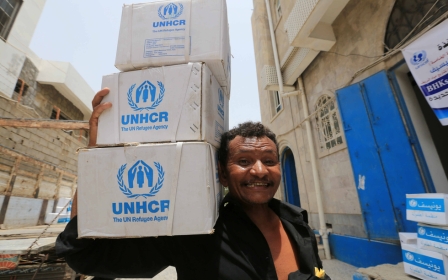'An outrage': Diversion of vital food aid leaves desperate Yemenis hungry

SANAA - Aziz Abdullah, 38, works as a vendor in the Yemeni capital Sanaa. Selling vegetables, he makes YR1,000 ($2) a day, struggling to eke out a decent living for his five family members.
Abdullah gets up early in the morning and spends the whole day working. Apart from occasionally being helped by a few generous individuals and some organisations, his only income comes from selling vegetables.
“To feed five people is very difficult nowadays because of expensive food prices and what I get is hardly enough to buy the most important items like wheat, oil, sugar and other basic items,” Abdullah told Middle East Eye.
According to the World Food Programme (WFP), eight million people rely completely on food assistance from the agency in Yemen.
However, organised crime networks have increasingly been diverting aid deliveries and using them for private gain.
New MEE newsletter: Jerusalem Dispatch
Sign up to get the latest insights and analysis on Israel-Palestine, alongside Turkey Unpacked and other MEE newsletters
As a result, desperate Yemenis complain that they have not been receiving food, while their wealthier and better connected countrymen have stocked up on aid and sold it at markets.
Abdullah said that while some organisations had provided him and his family with food from time to time, he had not received any from the WFP for more than a year.
“The WFP distribute monthly food aid in Sanaa and many neighbors, even those who are not needy, receive monthly baskets consisting of wheat, oil, beans and sugar, but I received it only once in my life.”
At a time when children are dying in Yemen because they haven’t enough food to eat, this is an outrage. This criminal behaviour must stop immediately
- David Beasley, WFP
WFP supervisors told Abdullah that he would receive a food basket next month, but when the next month came, he received nothing.
“When I lost hope to get food from WFP, I resorted to buying from the market because traders sell it for cheaper prices than other items”, Abdullah said.
“Some rich people receive food from WFP and then sell it to the market because its quality is not as good as other food items.”
Abdullah said that aid diversion happened with other organisations, but because WFP played the main role in helping many Yemenis, the diversion of its food was much more obvious.
“Diversion of food happens everywhere but people focus on WFP because it distributes huge quantities of food everywhere” Abdullah explained.
“We thank WFP for its role and hope they can manage to stop diversion.”
Desperation
An alarming 22.2 million people in Yemen need some kind of humanitarian or protection assistance, while an estimated 17.8 million are food insecure - 8.4 million people are severely food insecure and at risk of starvation, according to the UN's humanitarian agency OCHA.
On 31 December, the WFP accused the Houthi rebel group of selling vital aid in the markets of Sanaa. The Houthis rejected the accusation, accusing the WPF of sending rotten food.
"At a time when children are dying in Yemen because they haven’t enough food to eat, this is an outrage. This criminal behaviour must stop immediately," WFP’s executive director David Beasley said in a statement.
"Unless this happens, we’ll have no option but to cease working with those who’ve been conspiring to deprive large numbers of vulnerable people of the food on which they depend.”
Beasley called on the Houthis "to take immediate action to end the diversion of food assistance."
The next day the Houthis hit back, with Mohammed al-Houthi, head of the group's Supreme Revolutionary Committee, saying the WFP was "fully responsible for quantities of rotten food" it sent.
The Houthi official told Saba news agency that he had stopped food aid coming into the country because “it violates standards and regulations and is not suitable for human consumption.”
While the WFP and the Houthis exchange accusations, Yemenis are in increasingly dire need of assistance as malnutrition has hit millions. Some have accused the food aid supervisors of favouritism.
Mahmoud Hashim, in his 40s, was displaced with his eight family members and arrived in Sanaa in July fleeing the war in Hodeidah. He currently lives in his uncle’s house in the capital.
“I am a jobless man and my uncle can hardly pay for the livelihood of his family and we are a burden on him”, Hashim told MEE.
“I tried to register my name in a distribution centre of food aid but the supervisor said they cannot add new names.”
He stated that the supervisor of the distribution centre promised him that they would add his name by the end of this month, but Hashim did not believe him because he does not have an intermediary.
“Favouritism is the main reason behind our deprivation from food. If you know the supervisor you will get aid even if you are rich, and if you do not know the supervisor you will not get aid easily,” Hashim added.
“I saw myself that some rich people received food from the distribution centre and went to sell it in the market.”
Traders in Sanaa deny they buy food originally meant as aid from the Houthis or from rich people, adding that there was no regulation in place to prevent them selling it.
"Some needy people receive food aid from an organisation and they have enough food in their houses but they need money to buy other basics, so they resort to selling the food to get money," said one trader, who sells WFP food aid.
Both are accountable
Yemen's education ministry is a partner of the WFP and is responsible for the distribution of food aid in schools. Usually the school principals oversee the distribution.
A source in the ministry spoke to MEE on condition of anonymity because he was not authorised to speak to media: “The ministry supervises the distribution of huge quantities of food around the country and small corruption in some centres may happen.”
“The ministry is following the issues and I hope any corruption will be fixed and needy people will continue to receive food," he said.
I do not care about the reasons behind the diversion - all I want is free aid to feed my family
- Aziz Abdullah, vendor
Independent activists believe that both the Houthis and WFP are accountable for aid diversion.
Rasha Jarhum, director of Peace Track Initiative, an NGO pushing for the involvement of women, youth and civil society in peace processes, tweeted: “Both the Houthis and UN agencies are accountable of humanitarian diversion. This has been happening since the beginning of the war. Now that HRDs (Human Rights Defenders) raise the issue, and it is being picked up by the media, the UN threw the Houthis under the bus.”
Fatima Alasrar, a senior analyst at the Arabia Foundation, a Washington, DC-based think tank, also tweeted: “Sure, WFP needs to investigate the issue of spoiled wheat. Some wheat was reported to have been spoiled in the port because it was not cleared in time. But this doesn't absolve the Houthis from their thievery and diversion of aid. They created the humanitarian crisis in in Yemen.”
Abdullah said he didn't know anything about the back and forth accusations between the Houthis and WFP over missing food aid - he just hoped he could receive food next month.
“I do not care about the reasons behind the diversion - all I want is free aid to feed my family”.
This article is available in French on Middle East Eye French edition.
Middle East Eye delivers independent and unrivalled coverage and analysis of the Middle East, North Africa and beyond. To learn more about republishing this content and the associated fees, please fill out this form. More about MEE can be found here.





